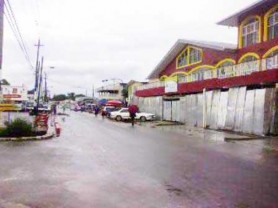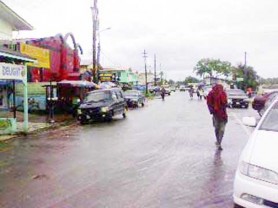An investor laments the decline of the Linden economy as Nicosia Smith takes the pulse of a depressed community
Stakeholders agree that the debilitated Linden economy is in dire need of a significant infusion of investment. How soon that investment will materialise and where it will come from is anybody’s guess.
Linden can no longer be legitimately termed a ‘mining town’ and with few alternative employment opportunities available, everything, including food on the table, is compromised.

Linden has also long gotten over the initial hype and sense of anticipation associated with the promised potential of the Guyana/ Brazil road link and its implications for investment in the township. That, as far as the pragmatic people of this community are concerned is very much in the future. The immediate concern is with what happens today.
No buzz
There is simply no buzz in Linden. An overseas-based investor whose partnerships in several enterprises make him the second largest private employer in the community bemoans Linden’s continual decline. Fridays, he observed, are customarily the busiest trading days in Linden. Two Fridays ago, however, the customarily congested Route 43 (Georgetown-Linden) Bus Park was almost deserted. Friday, he remarked, looked like Sunday. “In one year it has declined,” he remarked. He blames the crisis, at least in part on what he describes as “a lack of basic common sense. I come home to build a company, to serve and empower a community. It makes me want to cry,” he said. The investor whose interests include partnerships in a bakery, a mall and a supermarket declined to be named. Nothing, he said, is happening in the community to encourage investment. “When the young people graduate they have no jobs,” he added.
Compare Breads, the bakery in which he has an interest, is located in the Industrial Area. It was a multi-million dollar investment. So too was the supermarket, Kresent Foods. At its peak it employed close to 80 persons. That number has dwindled to a few. “It’s bad,” the investor said. He and his business partner are second only to BOSAI Minerals in terms of the quantum of their investment in Linden.

The investor’s concern with reinvigorating the community is evident. “We have to empower people. We have to learn how to speak to one another, to respect each other and we have to understand the importance of doing business with each other,” he said. He is concerned too about the social problems that sit alongside Linden’s economic woes; issues of unplanned and early parenthood, single parents, unemployed mothers and irresponsible fathers. He believes that over the past two years things have simply grown worse. After 45 years away from Guyana he acknowledged the positive changes but is also acutely aware of the evidence of social decline.
A 50% decline in mall/plaza sales
Crescent Plaza/Mall is another Linden enterprise in which the investor has an interest. The state of the mall reflects the reality of the Linden economy. A visit there found several stalls closed and only a handful of people around. Oats Boutique, a clothing and shoe store that opened in the mall in 2008, now does most of its business at the weekend or when there is an activity. Public occasions in Linden usually bring modest windfalls; that apart, it is always a hard grind. Other business owners in the mall put the decline in commerce at around 50 per cent. High unemployment, they said, means that “money ain’t circulating”. Food is the highest item on the list of priorities. Even the recently concluded Linden Town Week failed to meet trading expectations.
Some of the businesses inside the mall have opted for diversification or, as the owner of one of the businesses puts it, engage in “something on the side”. SEP Investments, one of the businesses inside the mall, has had to diversify its stock to focus on “call in” items, that can bring a quick turnover. SEP now retails “drinks of water” and confectionary. Ice-cream and other frozen treats used to be its main sellers. Business, the manager said, has declined by around 45 per cent over the past few years. He hopes that more job opportunities can be created in order to raise the level of disposable income but is unclear as to where those jobs will come from. Where new businesses open they are repeats of existing ones. Everyone depends on the same limited market.
Staggering
Linden Chamber of Commerce (LCC) Executive Secretary Wilfred Simmons said what Linden needs is “the right businesses.” He is optimistic about “the possibilities” once businesses bring what he describes as “the right product.” Linden, he said, is “staggering” but not “down and out.” Simmons believes too that investments should be planned. Limited spending power, he said, means the investments must be planned carefully. The LCC Executive Secretary is optimistic about the possibilities that could derive from trade with northern Brazil. Tourism, he said, also holds potential. There has been an increase in the number of hotel rooms and agriculture and manufacturing appears to hold some promise.
Bauxite is still king
Bauxite remains king in a diminished kingdom. Bosai, the Chinese bauxite operation, remains the largest single private employer in the community. Just over 500 people earn their living there. That, in the context of Linden is a small number. Last year the global financial crisis and the attendant drop in global industrial production slashed demand for the product. Bosai retrenched more than 100 of its employees though recent information suggests that the company may shortly re-hire those retrenched workers. This year, bauxite ship arrivals have averaged around three per month, about the same level as last year. In 2009, the company set its production target at 280,000 tonnes but subsequently cut that target to 200,000 tonnes. The latter target too was subsequently further reduced.
LEAP, LEAF and Caricom Insurance
Discourse on the state of the community inevitably involves the $2.2 billion Linden Economic Advance-ment Programme (LEAP), and its micro enterprise component, the Linden Economic Advancement Fund (LEAF). These were expected to generate increased levels of investment and small business growth. There is a widespread view that targets were not met. The project, which was expected to bring a measure of diversification from the community’s dependence on bauxite, ended last year. Caricom Insurance, which is managed by contractors who previously worked for LEAF has set up a micro-credit facility and some loans were expected to be approved in May this year. The loan limit, previously set at $500,000 has now been upped to as much as $1 million following consideration of the business projects submitted, according to the fund’s General Manager Leonard Forde.
Earning its keep
Chairman of the municipality’s Interim Management Committee Orrin Gordon is advocating that some of the township’s communities including Block 22 in Wismar and Amelia’s Ward in Mackenzie be placed on the tax roll to begin paying municipal rates. In 2007, a country wide Urban Deve-lopment Programme, funded by the Inter-American Develop-ment Bank (IDB), had included rate valuations for various communities in the different regions. Linden, Gordon said, is yet to see the final version of its tax roll. He believes that subventions to the municipality could be used to provide a stimulus package that could help bail Linden out. Increased returns from rates, received from the communities, he said, could generate revenue equivalent to around $5,000 per home per year. The most recent valuation of homes in the community was done in 1976, when these areas were not densely populated. Today, they contain an estimated 3,000 properties. Engage-ments with the authorities to advance this proposal are yet to take place.
Limited contracts denying many jobs
Junior Barrett, a Linden businessman believes that one way to generate jobs is to afford Linden contractors a more generous share of state contracts. He is peeved over what he says is the awarding of contracts for road projects in the region to extra-regional contractors. Barrett also complains about what he says is a lack of effective monitoring of these projects. “No value for money… people must come out and stop these works,” he said. Barrett said that the labour force for such jobs should be recruited in Linden.
Gordon too believes that contractors in Linden should be awarded more state contracts. He cited the need for urgent repairs to eight bridges on the Linden/ Lethem road and said Linden contractors should be given the first tilt at these contracts.
All of Linden may not yet have been infected by a mood of doom and gloom. No one, however, is under any illusions about the extent of the crisis and the need for something to happen, and quickly, to turn things around. Crime and the various other forms of social instability and economic decline are very much in evidence in Linden and the feeling that the township which, for years, had been an integral part of the backbone of Guyana’s economy has been all but forgotten, persists.





